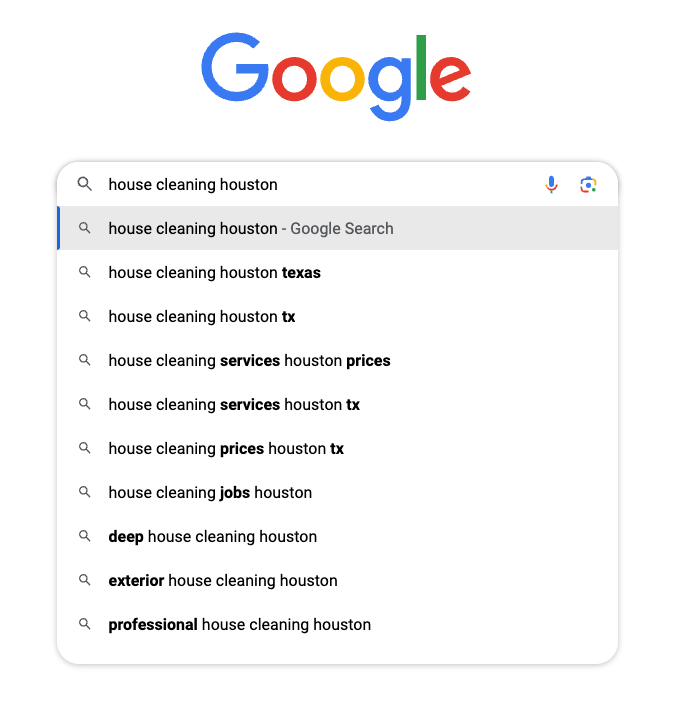Looking across hundreds and even thousands of searches, it’s clear that some people are looking for cleaners that share their values. Many people buy based on closely-held values and not service features, so understanding prospects’ values could yield valuable marketing and sales insights.
Table of Contents
It all starts with Google
I started my research with a basic search in the city of Houston since it’s a large city and would have enough searches for cleaning services to be a useful dataset.
I saw this auto-completed list, and wondered what the autocomplete for other cities looked like. Normally for this kind of research, you’d need Google’s Incognito mode in Chrome and a VPN to mask your location from Google’s search. Luckily I have a service called Ahrefs.com, which I’ll mention a few times in this article – it’s helped me understand SEO better from several angles.
I used Ahrefs to compare search results across different US cities. I didn’t end up needing a VPN since Ahrefs pulls the data themselves and doesn’t rely on my location to do so. What follows are all the surprises and discoveries I made while researching.
Side note: If you want to duplicate the auto-complete part of this research method, be sure and use Chrome’s incognito mode. This will make sure that your past searches don’t influence the results. Open Chrome (Google’s web browser and open the File menu – you’ll see an option to open a new incognito window, as shown below.
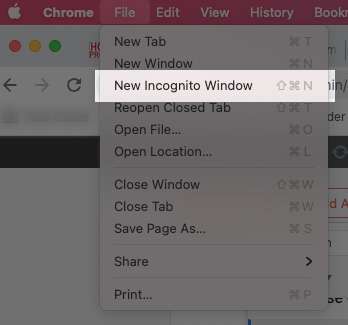
If you’re interested in using auto-complete for competitive and other kinds of research, Neil Patel has an interesting article about using auto-complete for SEO and customer research.
The insights
For this article, we’re specifically looking at searches and questions related to the term ‘house cleaning’. And as we’ll find, there are many terms and services that potential customers search for while researching house cleaning companies.
Who is searching?
People searching ‘house cleaning near me’ or ‘house cleaning [city name]’ are probably closer to spending money than someone with a general (no location) search. And, they’re ready to buy in your city – they could (potentially) be your customer. So they’re an important audience to consider.
Why should we care?
Well, these are our future customers. We want to sell them our services. To do so, we need a reasonable understanding of what they want.
Not assumptions about what they want, but what they actually want. On their terms. In their language.
Because we’re looking at customer search data, with searches performed with no one looking (except Google’s all-seeing eye), we can assume that any patterns that emerge reflect true customer intent, desire, or curiosity.
With this information, we’ll be able to speak to customers in their own language – reflecting their own pain points back to them. When this kind of communication occurs, it creates trust. Trust makes it easier to form relationships, and relationships are the foundation of a thriving and sustainable business.
Insight #1 – In some regions, a preference for ‘Maid’
What I found after reviewing 10 different cities is that people in the south and east people used the term ‘maid‘ to refer to house cleaning services. This isn’t the case in the rest of the country, particularly in Milwaukee and Seattle (two other cities I analyzed).
As an example, on Ahrefs.com (a tool to analyze search engine queries), one of the top search results for cleaners in Houston was ‘Maid Services Houston‘, with a search volume of 1,400 searches per month.
Compare that to ‘House Cleaning Services Houston‘, which had less than 700 searches per month.
For Houstontonians (I don’t think that’s a word), maid equals house cleaning.
For those of you starting house cleaning businesses, take note. Getting your business name right is an art, and it’s important to do your research for your region. At the bottom of this article, I’ve posted some search terms from a few major metros (and I’d be happy to provide a list of house cleaner-related searches free of charge in your city if you reach out and contact us).
We’ve also written a guide on naming your business with some ideas and tools that might help if you’re starting a business and want help generating names.
The difference between maid and house cleaning echoes advice I’ve heard on cleaning podcasts like X.
When we talk to customers, often we’re not focused on their pain. Instead, we’re focused on our own. Seeing these search results reminds us what the world looks like through the eyes of our customers.
If we can understand our customers’ pain and borrow the words they use to describe their problems, we’ll have a much easier time building trust and ultimately creating a lasting relationship. #realtalk
Insight #2 – Other notable regional differences
It’s no surprise that regions of the US differ in fundamental ways. We see those differences by comparing how people in different regions search for house cleaners. Here’s a list of search terms from Ahrefs.com related to house cleaning in Seattle, WA:
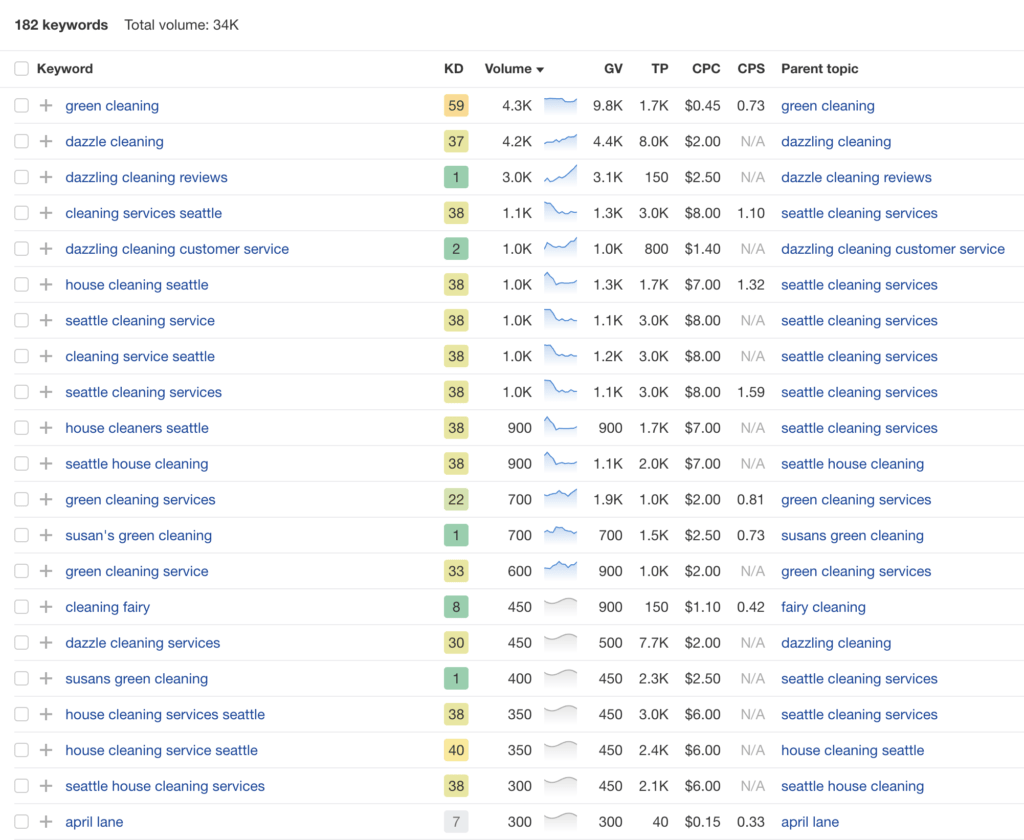
When we look at search engine searches in Seattle, we don’t see maids being used as much as in other cities and regions.
Seattle has a reputation for being highly eco-conscious, so it’s no surprise that green cleaning is a highly searched term. If you are a new cleaning business in Seattle, wouldn’t it be good to know how important ‘green cleaning’ is to your customers? Or even that there’s a customer base for green cleaning?
Knowing what services customers are interested in, and the language they use to describe them, can help you better sell your own services
It’s interesting to note that on a general scale, the terms in the above list reflect the general values of the population. There are fewer gendered terms being used for house cleaning (no mention of ‘maid’ in the list, fairy being a notable exception, maybe). There’s also an emphasis on environmental stewardship.
It’s something to think about as we market our cleaning companies.
Our clients connect with deeply held beliefs and values.
As cleaners, we enter people’s personal spaces. This is a vulnerable place, and customers need to feel trust that their home and belongings will be well-cared for. Some examples:
- the word Maid (from our Houston searches) emphasizes service
- Green cleaning (from Seattle) emphasizes environmental awareness and the safety of cleaning supplies.
Remember, people aren’t paying you to be the best cleaner. They trust (and therefore hire) people who share their values. This topic could be an entire book – in fact, Simon Sinek wrote a book on this topic: ‘Start with Why.‘
Insight #3 – Google’s ad platform Adwords charges more for localized ads
2x the cost. That’s how much more it will cost to run an ad on Google for ‘house cleaning Houston‘ ($6.00 avg cost per click) vs. ‘house cleaning‘ ($3.00 avg cost per click).
So why is this important? It shows us that advertisers value local searchers more. Probably because people searching within a city are closer to paying for a service. On Google, advertisers pay more for people close to buying a service than those simply doing background research on a topic.
Insight #4 – It pays to be next to your competition (on Google Adwords)
When I was looking through the search results, I noticed that local ads were around $6.00 to advertise (IE on the search term ‘house cleaning Houston’). Then I noticed that advertising for Merry Maids Houston was much cheaper – in the neighborhood of $3.50.
Here’s search volume and cost (bottom right – cost per click) for house cleaning houston searches
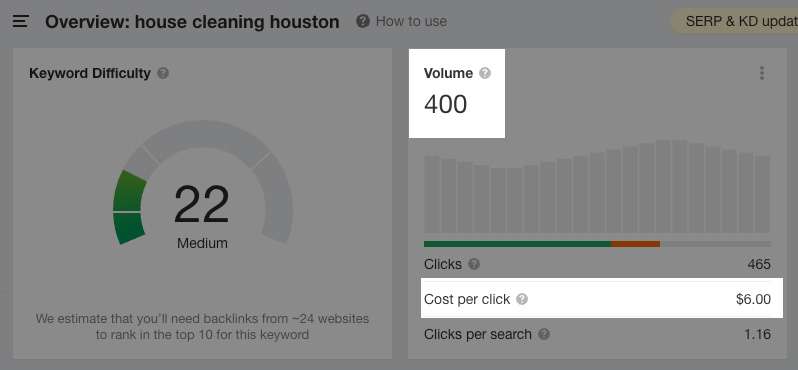
And here’s the volume and cost (bottom right) for merry maids houston searches
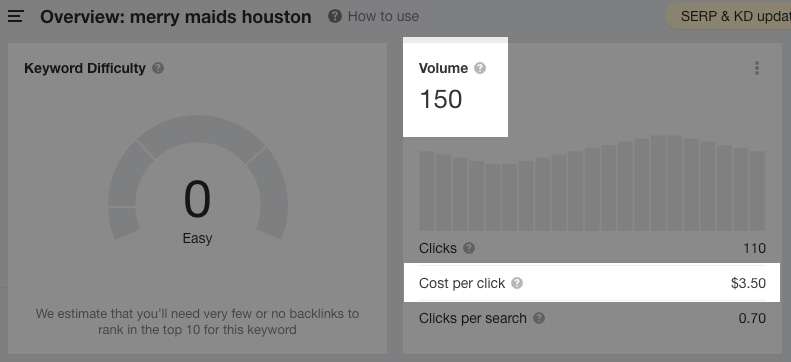
It’s possible to purchase ads against your competitors on Google – many businesses do this. I now understand why they do this – there’s the possibility of pulling in motivated searchers with high purchase intent for the potential of a lower cost per click.
This is only one step – you’ll need to qualify them, bid them and close the sale. It could end up that your conversation rate with Merry Maids customers is much lower than if you had gone with an ad against a ‘house cleaning’ term. Who can say? I’m just a humble collector of insights.
Tools and resources
if you’re interested to discover more, a few tools out there display Google’s autocomplete search data. There’s Answer the Public, as well as Ubersuggest. Both sites use autosuggest data and could be useful tools as you’re doing your research.
Here’s a quick tutorial on Answer the Public.
(Register to get access to 3 searches a day for free)
- Head over to Answer the Public.
- Once you’re on the home page, enter some terms into the input field on the front page:

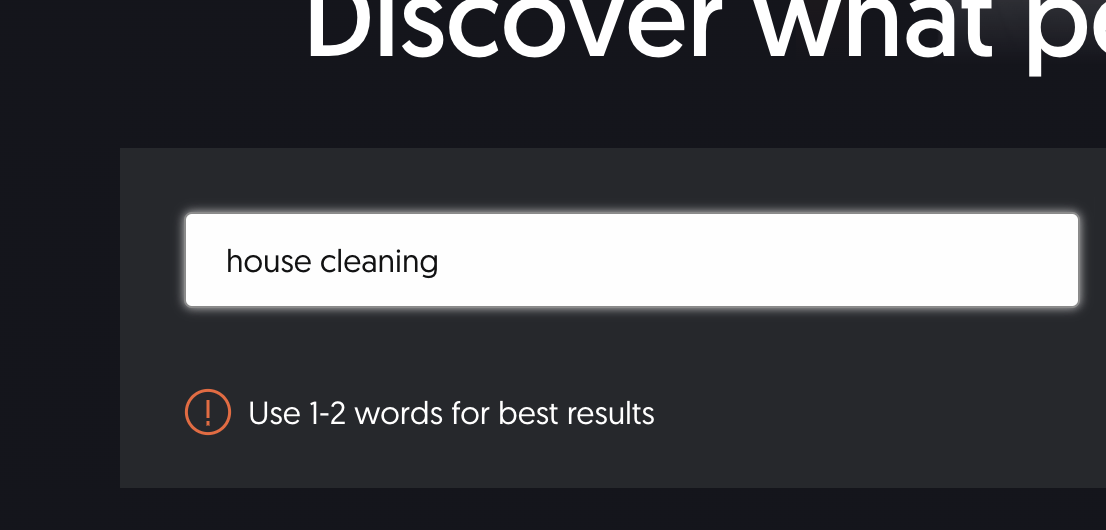
3. Answer for the People will drop you onto a results page with some useful tools for breaking down related search terms. One of the tools examines prepositions that appear in searches, and breaks them down. The ‘for’ area in prepositions has some interesting ideas for niches to specialize in.
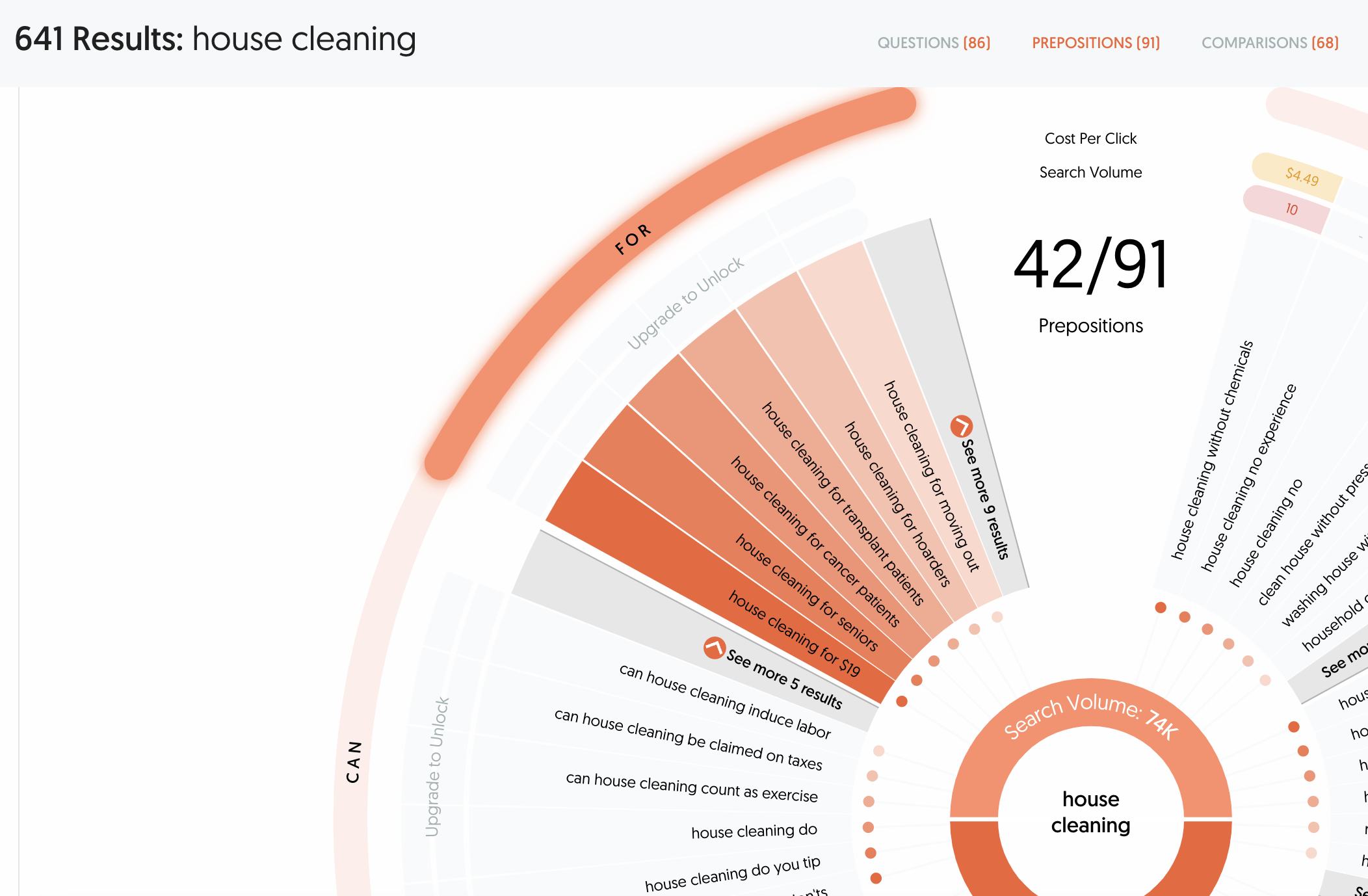
The page suggests some interesting niches:
- House Cleaning for Transplant Patients
- House Cleaning for Cancer Patients
- House Cleaning for Seniors
- These could warrant further exploration.
If people search for these items on Google, it’s a safe bet that there’s a market of some size for those services. It’s up to you to go out and find out exactly how big (or small) that market is. Happy hunting!
Search results from Cities around the US
How to read these search results:
- If you don’t understand the tables, don’t worry
- I present this merely as a value add for people who are interested in learning more
- These are common search phrases that include the core words ‘house cleaning’
- You’ll find lots of same-y terms, but some surprising words and terms populate the results
- Most important if you’re working on understanding your customer will be the search keywords
Breakdown of tables by column
- # is just an ID for each row
- Keyword is the search phrase, which may be missing a few words that aren’t relevant. (of, is etc)
- Country should be all US
- Difficulty is how difficult it is to rank for the keyword
- Volume – how many searches per month are performed
- CPC – avg. cost per click, were you to purchase an ad on Google’s Adwords platform
- CPS – Clicks per search – the ratio of clicks per search volume
I hope the context helps, and that you find some value in looking through these differing data sets. Drop a comment on the post if there’s anything else you’d like to see!
Seattle, WA

